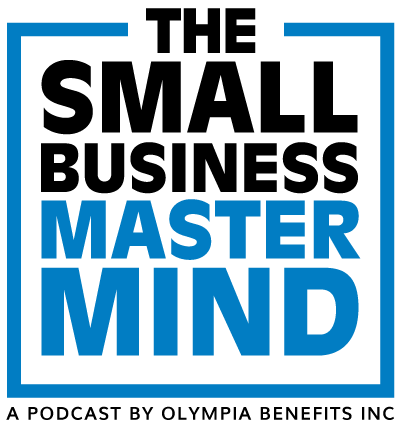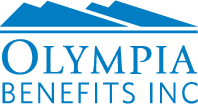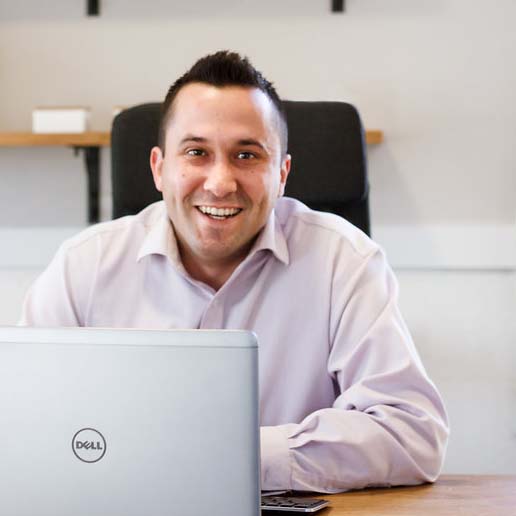Curtis Gabinet: Their letters are confusing and poorly written and nobody likes reading them and your blood starts boiling when you even open one of those brown envelopes. The process can be simplified and if you know "what are they asking for?" and "can I put it together and send it in?" it can be dumbed down and simplified and handled fairly.
[music playing]
Morgan Berna: You're listening to the Small Business Mastermind, a podcast created by Olympia Benefits to help small businesses juggle business, finance, health and wellness. I'm your host, Morgan Berna.
[music playing]
Morgan: Personal finance can be stressful. There's so many options and acronyms to keep track of, it's tough to know where to start and how to improve what you're already doing without getting a finance degree. Add in the word “taxes” and most of us completely shut down. That's why on this episode I sit down with two chartered accountants, Matthew Peterson and Curtis Gabinet of True North Accounting, to discuss everything you need to know to get and stay financially fit. Known for their simple explanations, Matthew and Curtis do a great job explaining some basic, and not so basic, concepts on this episode. We cover RRSPs, TFSAs, family tax advantages, changes coming this tax season, what to do if you get audited and much more. If you're looking to minimize your taxes and get the most out of your income, this is the episode for you. All right. Let's jump right into the conversation and I'll be checking in with you again at the end of the episode.
[music playing]
Morgan: Curtis Gabinet joined the True North Accounting team in 2016 and became a partner just two years later. Curtis connects with people naturally and enjoys building a relationship with clients. He's always quick to respond and has a sincere desire to help people, He's a Chartered Professional Accountant or CPA, formerly known as Chartered Accountant and has a strong background in small business accounting and tax. Curtis will fight the CRA for you and work all night to make sure your deadlines are met. He's patient and happy to explain things to clients several times, making sure no one leaves his office confused. He's also known for coming up with ridiculous analogies to help. He genuinely cares about your success and is here to work beside you every step of the way. Curtis is available any time by phone or e-mail to help you find solutions to problems big or small.
Matthew Peterson loves business and sees small business owners as the backbone of Canadian society. He earned his Chartered Accountant, now called Chartered Professional Accountant or CPA and his Chartered Business Valuator designations with PriceWaterhouseCoopers in Calgary between 2009 and 2014. He is passionate about business and wants to help small business owners achieve their goals.
While earning a Bachelor of Commerce in Finance from the University of Calgary, Matt ran his own lawncare and landscaping company. Understanding a small business owner’s perspective, he can communicate tax and accounting concepts in ways that small business owners appreciate and understand. You will never leave his office more confused than when you entered.
Welcome everybody. We are here with Matthew Peterson and Curtis Gabinet and we're going to be talking about a variety of topics here that employees should have on their radar. This includes RRSPs, TFSAs, family tax advantages, changes this tax season, audits, stock trading, what to do yourself and when to get an accountant and instalments. Maybe Curtis here you can let us know what will a listener be getting from this episode overall?
Curtis: Just a general understanding or more of an understanding than they probably already have as far as what these things are, what they mean, what you can do with them, when you're taxed, how they work and why you should know about them.
Morgan: Yes. I'll admit here that I was researching some of these and I never read up on them before and I am shocked at my choices, redoing everything.
Curtis: Yes, "Why have I been doing things the way I've been doing them?"
Morgan: "What am I doing?"
Curtis: "Why was I never taught any of this in school?"
Morgan: I think a lot of us have heard all these terms, but are we actually handing these properly? Are we using this to our advantage? How can we do better with our money. How about we start off with RRSPs, broadly what it is, when to start, some rules.
Curtis: RRSPs, a lot of people hear RRSPs and they think, "Okay, Registered Retirement Savings Plan. I'm saving for my retirement." And you are, in a sense, you are. They're tax sheltered, right? It's investment that normally if you invest money somewhere, you earn investment income, interest dividends, any form of investment income and you're taxed on that income. In an RRSP, that income isn't taxed, what it's earning is not taxed. It's only taxed when you take it out. So, it can grow but it's when you take it out that you actually pay tax on it. Another important thing and how I view, you can invest, it's great to invest and plan for retirement. There's so many different ways to invest, from an accountant perspective, you view RRSPs more as a tool to drop your income.
Morgan: Yes.
Curtis: Any given year. So, there's different times when it makes more sense than others.
Morgan: What you put into it when you file your income tax that year, that amount isn't included, correct?
Curtis: It directly reduces your taxable income that year.
Morgan: Okay, okay.
Curtis: So, often it's good regardless, right?
Morgan: Yes.
Curtis: It drops the income you're taxed on and you're putting amounts away for retirement and you're probably going to create yourself a tax refund that you can use. Oftentimes if you can pinpoint a specific tax bracket, with a little guidance, if you can use that RRSP contribution to get under a tax bracket and have nothing hit at that higher rate, it becomes more effective. Or if you have low income and you might not owe any tax at all, there's probably no point in putting in into RRSPs because you're not eliminating any tax, you're not saving yourself or deferring any tax. The idea is you're dropping your income, you want to level your income over the course of your entire life.
Morgan: Yes.
Curtis: The spikes and drops in income, it's inefficient overall.
Morgan: But you can't put an infinite amount into this, right? There's a limit every year?
Curtis: There's a limit. The more income you earn every year, employment income, increases your contribution limit and there's only so much you can increase it by each year, so you've only got so much room to work with.
Morgan: And if you over-contribute?
Curtis: If you over-contribute, I guess jumping back to that, Matt wrote down a number that it's kind of an 18% of your earned income is what your RRSP contribution limit goes up by.
Morgan: Oh, okay.
Curtis: Usually most people have a good chunk, like a normal person you're probably earning income early in your life prior to having anything extra to put away into retirement so you've grown it to a point. You got some wiggle room to play with. If you over-contribute, it's an ugly problem. It's terrible to deal with, you might not be notified of it right away, there's significant interests and penalties. It's a good problem to have because if you're over contributing to-- I don't want to say "good problem to have" but it's an ugly problem but it does mean that you got enough to contribute more than your maximum RRSP contribution limit. You're paying tax on the amount over your contribution limit at 1% per month, which that's just about credit card interest rates, right? When you look at it.
Morgan: Yes, yes.
Curtis: We've seen cases where people don't even know they're overcontributed for years and years and years, and then it's interest on however much over the course, It's horrible, you have to pull it out, and then when you pull it out all sorts of complications and ugly tax forms to file. You want to get a general idea of what do you like, ideally in a perfect world, you max out your RRSPs and then 18% of what you earn each year you're just contributing, you stay on top of it but not everybody, most people aren't in the share to be able to do that, right?
Morgan: So then you're taxed when you withdraw from this and are you are taxed based on how much money you were earning at the end? Around when you--
Curtis: When you withdraw, it just adds to your taxable income, so in normal scenario it's into retirement, you start pulling out RRSPs and your income has fallen down so you're in a lower tax bracket and you end up saving a good chunk of tax over the course of your lifetime. Depending how much you withdraw, the banks will often withhold tax from it automatically, just similar to income tax being taken from you on your T4, the banks, withhold it so you don't end up owing a good chunk at the end of the year. You can pull RRSPs out anytime, if you're in a scenario where you don't think that, if you may need to fall back on savings, it might not be the smartest idea to put that into RRSP because then you end up pulling it out at a later date if you have a big expense or big purchase coming up then you're taxed on it, right?
Morgan: Yes. So then our other option is TFSA? What is it, when should you start one, what are the rules people should know?
Matthew Peterson: I guess I'll take this one. TFSA is the Tax Free Savings Account. Whereas an RRSP saves you tax today, TFSA doesn't. You're investing after taxed income, so the benefit is, it's like the opposite of an RRSP, you invest in a stock portfolio or ETFs or whatever it is and the growth or the capital appreciation, the growth or the dividends, the interest, whatever return you're getting on those investments is always tax free. It's like six grand a year right now that you can contribute to your TFSA. And just keep in mind, with RRSPs and TFSAs we hear a client say, "Oh, I bought some RRSPs," or, "I bought some TFSA." The investment choice is separate from making that contribution. You can invest in whatever you want, use a financial advisor, wealth planner or Wealthsimple or something like that to make those investment decisions. Just from a tax perspective though you invest, say it's a dividend paying stock like a mainstream pipe line company or something like that, it's paying 5% dividends, you can use those dividends to buy more stock and that's really compounding interest. If you do that in your 30s and in your 60s, you can then switch that stock repurchase to start paying out dividends and that's cashflow after you retire and that's really tax free cash flow. Another, I guess, perspective is you can buy-- if you're taking a gamble on a risky stock that might go 10x or something like that, if you do that in your TFSA, that's a huge amount of capital appreciation, that's totally tax free.
Morgan: Oh, yes.
Matt: The downside is if you lose everything you don't get to use that capital loss. Some schools of thought are, "Just invest in interest bearing steady income-producing assets in your TFSA." Other school of thought is, "Take your risk in your TFSA"
Morgan: Go for it.
Matt: Yes, go for the home-run.
Morgan: Between these two, RRSP and TFSA, they're just kind of types of accounts but within them you can do different things?
Matt: Yes.
Morgan: You can invest or you can just directly save as well, can't you?
Matt: Yes, you can put it into a high interest savings account or something like that, if you have no risk tolerance.
Morgan: Yes. Are there any, I guess, downsides to the TFSA? Or anything that-- can you over-contribute to it as well, anything like that?
Matt: Yes, definitely. With both of them you just want to keep-- before you put in a big contribution, just know where your limits are. Right now it's 63,000 and change or something like that that you contribute because it just-- Stephen Harper started it in 2009.
Morgan: Okay. If you've never put money in you can have a shot with that 63,000 everyone's got sitting aside.
Matt: As long as you've been eligible for all those years. I guess I'll just make a note on that, yes, you're not accumulating TFSA until you're 18 and if you're a non-resident, both of these they're considered trust accounts. So, if you've been Canadian and then you've moved somewhere else for work, there's a lot of people that go to the Middle East and then there's no income tax over there so they cut they residential ties here so they don't pay tax in Canada. When they do that, all the money they have in their RRSP gets taxable and you have to be a Canadian resident to have money in either of these accounts.
Morgan: Okay. All right, good to know. Moving on we're going to talk about some family tax advantages and I've got noted here that there is CCB, dependents, and disability tax credit. Are these things that families should be looking at? Are there difficult requirements?
Matt: Yes, this is another change that Trudeau brought in a couple of years ago. Whereas we used to have the fitness allowance for your kids, you got a tax deduction if you put them in hockey or baseball. There's still the arts one but we've gotten rid off that fitness allowance and instead it's just called the Canada Child Benefit.
Morgan: Okay.
Matt: So, families get a tax free amount, that gets sent to them each month and it's based on their household income.
Morgan: Okay.
Matt: There's some calculators online that if you are about to have a kid or a second kid, even as your kids move up, the amount you get changed, under six is a certain grade and then it's seven to 18 years.
Morgan: Oh, okay. So, you can calculate to see if you qualify.
Matt: Yes, or just to know how much to expect next year.
Morgan: Yes.
Matt: But yes, it can be for, I guess I don't want to put any numbers out there but it can be pretty significant. They’re only making life in Canada more affordable for families for sure. And then the disability tax credit, if you're disabled you got your doctor to fill out a form which then you have to sign, you send it into the government. They have to send it back approved and then you can use that tax credit.
Curtis: There's quite a few different programs or credits or benefits or deductions like that, and not all of them are common. A lot of times we see clients, the common thing is, "Oh, I'm going to send you my tax stuff for the year." And we get some documents to show up and it's like, "Well, you didn't give us any medical write-offs, maybe there is a disability in the family, are you even claiming this? Do you know this exists?"
Morgan: Yes.
Curtis: There's a lot that people don't even know, right? A little bit of research or asking or just a quick sit down with your accountant if you have one or even asking friends and family, "What do you guys write-off?" You might just not know that I donate to tons of places I'm not claiming any of that because I didn't even-- some of them are really, really simple ones.
Morgan: Yes. Okay, so, maybe this is the fun or scary one, I guess, you'll let me know. Changes this coming tax season?
Curtis: Some of them are major, some of them are minor, some of them won't affect anybody, it all depends. That's a terrible way to phrase it, "It depends, it depends."
Morgan: "Just stuff, maybe, I don't know." [laughter]
Curtis: So, understanding your own scenario like the CPP changes, CPP contributions are going to be increasing for everybody, right?
Morgan: Okay.
Curtis: Some people might be at an income level where, I don't know, half way through the year all of a sudden, they hit maximum CPP and now they don't have to contribute anymore so their monthly paycheck has just gotten bigger. The CPP over the next few years is increasing so the maximum's going up, so employees have to continue to contribute, which means employers have to contribute and match that. When you multiply it by however many employees you have as a business owner it could be significant. There's maternity leave, was it 12 months before now you have the option to extend it to 18 months with the-- they factor in the smaller amount per month but you're able to take more time off and stretch it over 18 months. We sent out a newsletter all the time, so anytime we identify anything that's going to affect our clients, we're trying to put it in their face, right? Because we don't know everyone's personal life and everything that affects them and what they do and where they earn all their income and where they spend their money. So, just presenting it to them so they can bring it forward, "Hey! This applies to me, is this something I can take advantage of?"
Morgan: Yes.
Curtis: For a while there was that family tax cut that saved every household $2,000 and then they did away with that and everybody was mad that they couldn't claim that again. And then the child fitness one, they that away and people are still sending in. So, there's no huge, major changes for this upcoming tax season that I'd say everyone needs to be aware of and track this down and collect them and give them to your accountant but there are little minor things for sure.
Morgan: Yes. So, I know your company does a blog with this kind of stuff, is there anywhere else people should be looking just to keep themselves first?
Matt: I don't know, truenorthaccounting.com is probably your number one source.
Morgan: You think that's a good one? Yes. [laughs]
Matt: Shameless plug. There's a website called The Balance and they have Canadian and American articles but it's really geared around personal finance. Even the CRA website though, if you just want to know black and white, "What can I do? What can't I do?" You can look on that, TurboTax, they have a good community and a blog, like if you have questions around your rental property income or something like that. There's some forums out there, Reddit has so much good stuff on it too.
Morgan: Yes.
Matt: But yes, Intuit which makes TurboTax and QuickBooks and all that, they just have a big community.
Morgan: Yes, all right. So, I'll make sure I'm linking some of these down in the description for everyone listening. Of course, True North's blog will be linked in that one, which is really great. I was taking a look at that before, it's got nice, simple explanations of things. Okay, so moving on, the next topic we've got here is audits a.k.a process reviews. I guess simply what is an audit? Maybe why would someone be picked and how can you handle it?
Curtis: So, there can be triggers, we'll talk about some of those. It can be completely random, and the whole Canadian tax system is based on self-reporting, right? So, the government doesn't know a lot of this stuff, you're reporting your own personal tax situation and they have to test and confirm some of this stuff to keep people honest essentially. So, a lot of the times, there's common ones, high medical expenses, certain things that are unusual. I'm sure their system is sophisticated enough for it. It immediately upon filing will run ratios and pick out certain things that are abnormal from prior years and so on. And most often you get a letter in the mail, you see that nice brown envelope that everybody loves taking out of the mailbox and it's CRA written letter that's hard to understand and if you haven't seen one before you're usually not even sure what they're asking in the first place.
Morgan: Yes.
Curtis: Sometimes it's just, "Hey! We've picked this amount, you claimed medical of X, we need to confirm that." And you've got to put together all your receipts that you claim that add up to that amount and send them all in, you can do a lot of this electronically and submit through their website to make it a lot easier.
Morgan: Yes.
Curtis: If you commonly have large medical expenses in your family then knowing that that's a common one to be reviewed by CRAs. Is not a full-blown audit, it's a simple review where they just pick one thing or two things and they say, "Okay, you claim this, show it to us." And you just have to send it in and usually you'll get a letter back saying, "Okay, no, we've accepted it. No changes have been made." It's just to keep people honest. Sometimes it'll be a little more aggressive from CRA where they start questioning things and disallowing things and a spiderweb ensues where it might link to something else and then they're looking at a few more things. Moving expenses, any large credit vehicle, expenses, if you have employment expenses and you're writing off vehicle. There's certain other ones that seem to trigger it more. And then every year CRA seems to pick a couple that they really like to check on and then they kind of mass send those letters out to check on what people are filing and why and if they're allowed. Their letters are confusing and poorly written and nobody likes reading them and your blood starts boiling when you even open one of those brown envelopes. The process can be simplified and if you know "what are they asking for?" and "can I put it together and send it in?" They give you 30 days and you can usually request an extension and even if it goes beyond that extension, not that I recommend pushing the limits but you can usually still provide the support after the fact and it's accepted.
Morgan: Okay.
Curtis: So, it can be dumbed down and simplified and handled fairly.
Morgan: So, just for anyone, if you're going to have a big expense just make sure you're hanging on to all your paperwork, otherwise are there any other common reasons it might happen? Maybe someone doesn't make any large purchase that year, is there anything that person could do to just make sure they're good or is the risk pretty low?
Curtis: It depends. If you just have tax slips, if you just have T4s and T5s and a few other things and you're not claiming anything unusual, you're probably not at high risk. If your employer doesn't file your T4 for you and you submitted and you claim this income and this income tax withheld and this CPP, you might get one that wants to see that T4 because your employer never actually submitted it to CRA. But if there's nothing complicated going on you're probably not going to see one fairly often.
Morgan: Do you have something to add, Matt?
Matt: There's probably a 30-day window from the day they mail it, which if it takes a few days to get there you're probably down to three and a half weeks that you need to figure it out, so don't ignore those things, even if you don't understand it. Just send it to your accountant.
Morgan: Yes. So, we're going to talk a little bit about stock trading.
Matt: Yes. You can purchase stocks through a dealer or an advisor. If you do go the self-directed route, there's tons of options out there right now. We've all seen the Wealthsimple and the Questrade commercial. If you invest in your TFSA or in your RRSP, don't even worry about it. This is only if you have a non-registered account and it's self-directed and you're day trading or buying and selling stocks, even just once or twice during the year. When it comes down to do your taxes you got to claim the cost, your cost and the sale price. There's this new slip that came out a couple of year ago called T5008 slips, that your bank should send you. Sometimes they have the costs for that share on it, often they don't, so you have to really just keep all your trade summary slips.
Morgan: Okay. And then you submit that when you do your income tax filing?
Matt: Yes, yes. And, yes, you're taxed on your capital gains, if you have capital losses you can carry those forward, back three years, forward 20 years and apply them against capital gains.
Curtis: A couple things to note, like Matt mentioned, those T5008 forms, they're not perfect and they do often get spit out into your hands in the mail with just proceeds.
Morgan: Okay.
Curtis: They won't have the cost, so be careful, make sure you know the cost of what you bought something for if you sold it, because if the slip only has the proceeds, that means CRA only knows the proceeds which means if CRA challenges something, they see the proceeds as a full 100% gain that you're taxed on and so, if they challenge it, you have to give them support to show the cost. That can be a big one. Some of the most common simple tricks, there's certain rules between-- right near the end of the year it's always good to take a look at, if you have an investment portfolio, how is it done? Do I have huge gain that I'm about to report come tax time? If I do, maybe I want to take a look and pick some of the losers and sell them at a loss because that loss will shrink your gain, it'll apply right against it. You have to wait 30 days if you want to purchase that back for the loss to kind of solidify but there's some simple ways to take advantage of the way the tax system works there.
Morgan: Yes. Next we're going to chat about instalment. What are instalments? How do you make them?
Curtis: Installments are CRA requesting that you prepay your taxes essentially.
Morgan: Okay.
Curtis: If you owe over $3,000 dollars, and this is personal tax. If you're a sole proprietor, your personal GST. For a corporation, it can be GST, corporate tax, provincial tax. If you owe a lot, they want installments for the future year. There's a few different ways they calculate it but usually they're just going to look at what you earn or what you owed in the prior year and cut it into four quarterly payments, and then they want those in advance. The idea is that they're forcing you to prepay so you don't have a gigantic tax bill again, and they get their money upfront and they make sure you don't go delinquent. You can also choose to make instalments yourself. If something happens different than a common year and you know you're going to owe tax, you can choose to go online. You can submit these through online banking through CRAs website, you can mail a cheque in, there's a bunch of different ways to pay them but it's a way to get out ahead of, "Hey! I know I'm going to owe tax come the end of April this year, so I'm going to go write a check for $1,000 dollars, send it to CRA so I lighten the burden at the end of tax season." The worse part that most people have voiced their displeasure on is that they charge you instalment interest if you don't make them. So, they're requesting tax payments paid in advance for next year's tax that's completely based on an estimate and they don't even know if it's actually going to happen, right?
Morgan: And then they're going to charge you interest?
Curtis: And then they charge you instalment interest if you don't make them. It gets a little more complicated exactly when the instalment interest applies depending how much you owe in the following year, because it is an estimate.
Morgan: Yes, it just sounds like if it's been requested of you, do it so you can avoid that.
Curtis: CRA doesn't mess around, right? They request something, they charge you interest, they're going to get their money in the end. It can be a good tool too instead of having to set money aside in a separate savings account and focus not spending this, you're kind of just putting it in your own CRA account to set it aside yourself. If you overdue your installments or you don't owe as much in the following year, you just get it refunded to you.
Morgan: Yes.
Curtis: So, it doesn't just disappear but again, you'd have to owe quite a bit before they request these but they do exist.
Morgan: Yes, good to know. Well, we sort of just lightly we touched on all these topics on this episode, but let's talk a little bit about when someone should get an account and if they should when they should and maybe just some things that an accountant can help someone with their personal finances with, so that maybe someone listening would like to learn a little bit more about one of this topics or just get a little more financially fit for this year.
Matt: Yes. On the personal tax side, if you can do it yourself or if it's just a T4 slip or even a few slips in the mail, it's pretty simple. There's TurboTax out there, there's Ufile, which are very affordable and they walk you to the process, lots of resources. So that's you, you don't really need an accountant. As an employee there's not a lot of flexibility you have for write-offs and that sort of thing anyways.
Morgan: Yes, totally.
Matt: As soon as you get into a sole proprietorship or a firm or rental property or if you have foreign assets, there's certain reports you have to do it around that. Employment expenses if you're a sales person or you're required to travel on your own dime for work, there's another slip you get, called the T2200, which allows you to expend some of those expenses.
Morgan: Yes.
Matt: Those are a little bit more complicated, so if you just feel overwhelmed and one of those apply then that's when I would find an accountant.
Morgan: Yes, yes. And for someone who's never worked with an accountant before, is it something where you hire someone and then you work on an ongoing basis, you just work together once a year around tax season, what's that relationship look like?
Curtis: Usually, we see people bounce back and forth, you want to find the right fit with an accountant. Whether you have a business, whether you have your personal taxes and it's less complicated, whatever the level you want, you want to make sure you can go visit someone once and have them help you. If it's a complicated year, you can walk into H&R Block and have them file it through their system because they might know a bit more than you do, or you could look up online. You're going to talk with this person a couple times a year, there's going to be the back and forth, there's going to be questions, you're going to build that relationship. You want to find someone that it works with because depending on the scenario, most times everybody is entering the same slips into tax software program.
Morgan: Yes.
Curtis: And it's spitting out the same information, at the end of the day you want someone that you like working with.
Morgan: Yes. Or someone who can mention things like those family tax advantages you two mentioned or the investment options, I think, as well.
Matt: Also, somebody that will stand behind their work. So, just finding an accountant that knows that if those letters come and receipts need to get sent in, they're going to do that for you and meet that deadline and make sure you don't get--
Morgan: Yes. So, ask that upfront?
Matt: Mm-hmm.
Morgan: Yes. Okay, well, for anyone listening they've heard this episode about two weeks after our first one, but we have been here recording for quite a while, so thank you so much. Both Matt and Curtis been having to slide between a single mic on their little wheely chair. It's been a good sight for me. [laughter] Did you two have anything else you wanted to add to this? Maybe a big thing you want people to make sure they're doing, top of the new year?
Curtis: Yes. Get your paperwork together and be organized and make sure your accountant's happy, because it makes a difference. If you are reaching out to an accountant, make sure it's somebody that you feel good working with, because you might be with them for a long time if it all works out, and you want to avoid confusion. Things can get complicated and you don't want to or like to deal with most of this stuff, there's a few people that do, that's why we have a job essentially.
Morgan: Yes.
Curtis: So, don't be confused, don't let yourself be confused, get the answers you want and reach out to your accountant and get clarity.
Morgan: Yes. You have an office in Okotoks, if anyone is looking to work directly with True North and you're also opening one this month, January, in Calgary?
Matt: Yes. Mid-January we should be opening in Bridgeland, which is exciting for us. Yes, stop on by and ask some questions. We got lots of resources that can kind of guide you along, especially if you're thinking about launching a small business or going out on your own.
Morgan: Yes.
Matt: That's kind of where we specialize and we'll walk you through all that.
Morgan: Awesome. Okay, well, thank you guys so much for all your expertise.
Matt: Well, thanks for having us, that was a lot of fun.
[music playing]
Morgan: Thank you so much for tuning into this episode of the Small Business Mastermind. If you'd like to be notified when future episodes are made available, you can visit olympiabenefits.com/thesmallbusinessmastermind to join our notification list. The link will be available down in the description for you to click as well. All right, that's all we've got for this episode. I want to say another big thank you to our guests that did this two-part series. If you haven't checked out part one, it's all applicable information for business owners, so you can give that a listen if that fits you, otherwise I'll be talking to you again very soon.
[music playing]
[END]





